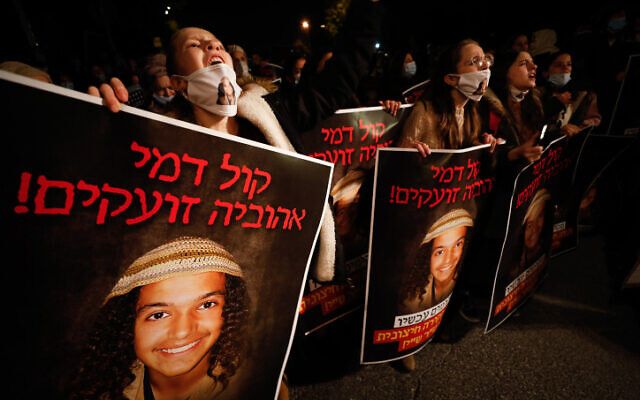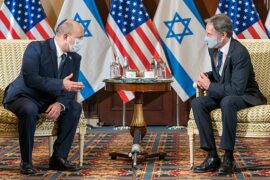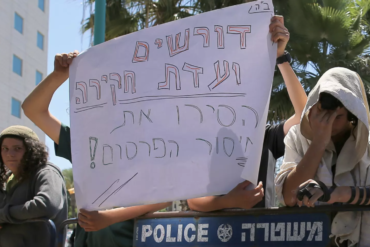An Israeli police officer from the controversial Yamar Shai unit was arrested over the weekend in connection with the December 21 death of 16-year-old Ahuvya Sandak but was released on bail Sunday, with limitations imposed on the officer until the end of proceedings against him.
The state prosecutor’s office has also cancelled a request that journalist Kalman Liebskind appear to testify before investigators.
Liebskind had published testimony from one of the officers involved in the case, which led to the the arrest of the Yamar Shai officer now suspected of obstruction of justice – come to testify before investigators.
The police department’s internal investigations unit made clear in a statement on Sunday that Liebskind “was not called to testify in the investigation as a suspect, and is not suspected of any crimes whatsoever.”
It was also reported that a second officer was questioned by the Justice Ministry’s Police Internal Investigations Department on suspicious of coordinating his story with other officers involved.
It had initially been announced that the police officers involved in Sandak’s death would not be facing prosecution and that indictments would instead be filed against Sandak’s friends who had been riding in the car with him at the time of the police chase that resulted in the death.
The reports led to the eruption of nightly protests throughout the country, mainly in Jerusalem and the West Bank. Many of these protests have ending with violent police actions against demonstrators.
But the demonstrations may have also succeeded in directing too much attention to the issue for investigators to risk a cover up. The survivors of the incident were finally given a chance to give their statements to the investigators last Thursday.
Sandak’s friends had not been summoned to testify until Wednesday and were only summoned then as a result of widespread public criticism against the investigators for not bothering to hear testimonies from the boys who had been in the vehicle during the incident that killed Sandak.
Prime Minister Binyamin Netanyahu (Likud) reportedly spoke with Sandak’s parents last week, expressing condolences on the death of their son. Netanyahu invited the parents to his office but they responded by inviting the prime minister to their home in Bat Ayin.
Meanwhile, hundreds of demonstrators held peaceful protests in front of the Jerusalem offices of the police interrogation department throughout the week, demanding an independent external commission of inquiry into the incident that led to Sandak’s death.
The public is justifiably concerned that police involvement with the investigation will only enable a cover up and protect the officers involved in the incident answering for the actions that caused Ahuvya’s death.
Protests calling for an independent investigation into the conduct of the police resulted in numerous clashes between officers and unarmed demonstrators, with several protestors, including many minors, arrested for participating in the demonstrations.
Member of Knesset Amit HaLevy (Likud) sent a letter to Internal Security Minister Amir Ohana (Likud) two weeks ago, asking the minister to address serious concerns regarding police behavior, specifically the Yamar Shai unit, towards Jewish teenagers in the West Bank associated with the “hilltop youth” subculture.
“Over the past few days, a whole litany of evidence has come to my attention, in the wake of the death of Ahuvya Sandak and the investigations regarding the tragic incident, which has produced a very grave picture of the way in which police conduct criminal investigations in Judea and Samaria, conduct which demands your personal attention,” HaLevy wrote.
“The investigation into the death of Ahuvya is still in process, and I would like to hope that despite previous experience, it will result in the truth being uncovered and those found responsible being held to account. The thought that the police vehicle intentionally hit the car in which Ahuvya was traveling, leading to his death, is extremely disturbing, no less than the reports alleging that Ahuvya was left to bleed to death without anyone going to his aid, despite the pleas of his injured friends.”
According to the lawmaker, “A clear policy must be established with regard to the way in which police treat hilltop youth – a policy that outlaws all manner of force, humiliation, or harm, other than in extreme and exceptional cases that are clearly defined in law where it may be found necessary to utilize force in order to protect the lives of police and/or citizens. To my distress, the picture that emerges from multiple sources is in sharp contrast to this – it appears that the regular behavior of police toward youth includes use of violence, shaming, and abuse that serves no purpose in enforcing the law. This creates the perception that police behavior stems from their hatred toward the youth and that police exploit the opportunities of their interactions with the youth in order to exact punishment and even revenge. Specifically, this practice of ramming into vehicles from behind has been documented at least three times and was even singled out by a court, three years ago, when the police were ordered to cease using such tactics when chasing after suspects.”
MK HaLevy added that “The impression is that this attitude stems from a delegitimization of the hilltop youth which deteriorates into a virtual dehumanization of them and creates an atmosphere of their blood being cheap.”
The lawmaker then asked Minister Ohana to personally monitor the investigation into Ahuvya Sandak’s death, including its conclusions.
“The most important thing is to ensure that there is a systemic change in the way police conduct themselves, and that the shortcomings in their behavior are addressed,” he concluded.
“I would also be very grateful if, at an early stage, a meeting could be held in your office with representatives of the youth and their families, in order to hear their complaints first-hand.”
MK HaLevy was also one of 19 lawmakers from many different political factions that sent Ohana a similar but separate joint letter calling on the minister to establish an external commission of inquiry.
Dozens of rabbis, including prominent heads of yeshivot and city rabbis representing diverse philosophies and approaches to Torah, also called on Ohana to set up an external commission of inquiry to investigate Sandak’s death and the procedures of the Yamar Shai police unit.
“We are saddened by the shocking incident in which Ahuvya Sandak was killed during a police chase that ended in a serious accident. This is a very serious, painful and unprecedented event. We fear an abyss that may open up between the Israel Police and large sections of the public, especially the youth, in the wake of this tragedy.”
In conclusion, the rabbis also called for the establishment of an external commission of inquiry.
“It is of the utmost importance to restore trust. There is no other way to do this than to establish an external commission of inquiry. A police inquiry or focused investigation by Department of Police Investigations, even though they are important, will not restore public confidence, and we will all be harmed by that. We appeal to you to exercise your authority as minister of public security and to establish an external commission of inquiry to examine the procedures of the nationalist crime division in the Judea and Samaria district.”
The Ḥoneinu legal aid organization had criticized the decision to charge the four boys in Ahuvya’s vehicle at the time of the incident with involuntary manslaughter.
“The blood of the next boy who is killed will be on the police and the department of internal police investigations. Anyone who does not conduct an honest investigation into the killing of a Jewish boy is paving the way for the killing of the next boy.”
The abusive mistreatment West Bank Jewish teenagers who fit the general “hilltop youth” profile have been receiving for years from Israeli police results from a prevalent attitude against them in the dominant sectors of Israeli society. Ahuvya’s blood isn’t merely on the hands of the Yamar Shai officers who caused his death but also on the politicians, news outlets, media personalities, judges and academics that have spent years demonizing and dehumanizing these children.
A minority of these kids might be violent or otherwise lawless but what really frightens their opponents is that they represent a Jewish identity that stands as a counterweight against drives to westernize Israeli society. And as a result, they’re often presented to the general public as a danger to the state.
Rather than establishing special police units to abuse these children, state money could be better spent on establishing programs to help them find more positive outlets for expressing their commitment to the Jewish people and Eretz Yisrael – outlets that don’t drive them into conflict with the state or with their Palestinian neighbors.
As far as the investigation into Ahuvya Sandak’s death is concerned, the focus must remain on the Yamar Shai officers involved and not be cynically shifted to the surviving victims






This guy lays it out in an interesting way.
Ahuvya Sandak Murder Theater – ACT II:
In Which a Dissolute Justice System Reveals its Iniquity
https://savethehilltopyouth.substack.com/p/ahuvya-sandak-murder-theater-act